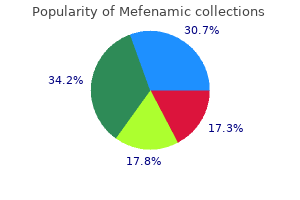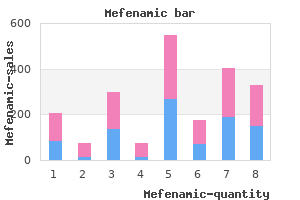"Cheap mefenamic 250mg without prescription, spasms verb".
By: H. Moff, M.B. B.CH., M.B.B.Ch., Ph.D.
Professor, University of Cincinnati College of Medicine
That he might have more time for this great work spasms between ribs 500 mg mefenamic otc, he appointed a day when they might all come together muscle relaxant vitamin safe mefenamic 250 mg, which from thenceforward they did every week spasms homeopathy right side mefenamic 500 mg for sale, namely muscle relaxant antagonist purchase cheap mefenamic, on Thursday in the evening. Such a society is no other than "a company of men having the form and seeking the power of godliness, united in order to pray together, to receive the word of exhortation, and to watch over one another in love, that they may help each other to work out their salvation. To see each person in his class once a week at least, in order: (1) to inquire how their souls prosper; (2) to advise, reprove, comfort or exhort, as occasion may require; (3) to receive what they are willing to give toward the relief of the preachers, church, and poor. To meet the ministers and the stewards of the society once a week, in order: (1) to inform the minister of any that are sick, or of any that walk disorderly and will not be reproved; (2) to pay the stewards what they have received of their several classes in the week preceding. There is only one condition previously required of those who desire admission into these societies: "a desire to flee from the wrath to come, and to be saved from their sins. It is therefore expected of all who continue therein that they should continue to evidence their desire of salvation, First: By doing no harm, by avoiding evil of every kind, especially that which is most generally practiced, such as: the taking of the name of God in vain. The profaning the day of the Lord, either by doing ordinary work therein or by buying or selling. Drunkenness: buying or selling spirituous liquors, or drinking them, unless in cases of extreme necessity. Fighting, quarreling, brawling, brother going to law with brother; returning evil for evil, or railing for railing; the using many words in buying or selling. Uncharitable or unprofitable conversation; particularly speaking evil of magistrates or of ministers. Doing what we know is not for the glory of God, as: the putting on of gold and costly apparel. The singing those songs, or reading those books, which do not tend to the knowledge or love of God. Borrowing without a probability of paying; or taking up goods without a probability of paying for them. It is expected of all who continue in these societies that they should continue to evidence their desire of salvation, Secondly: By doing good; by being in every kind merciful after their power; as they have opportunity, doing good of every possible sort, and, as far as possible, to all men: To their bodies, of the ability which God giveth, by giving food to the hungry, by clothing the naked, by visiting or helping them that are sick or in prison. To their souls, by instructing, reproving, or exhorting all we have any intercourse with; trampling under foot that enthusiastic doctrine that "we are not to do good unless our hearts be free to it. These are the General Rules of our societies; all of which we are taught of God to observe, even in his written Word, which is the only rule, and the sufficient rule, both of our faith and practice. If there be any among us who observe them not, who habitually break any of them, let it be known unto them who watch over that soul as they who must give an account. Our doctrinal affirmations assist us in the discernment of Christian truth in ever-changing contexts. Our theological task includes the testing, renewal, elaboration, and application of our doctrinal perspective in carrying out our calling "to spread scriptural holiness over these lands. As United Methodists, we are called to identify the needs both of individuals and of society and to address those needs out of the resources of Christian faith in a way that is clear, convincing, and effective. The Nature of Our Theological Task Our theological task is both critical and constructive. It is critical in that we test various expressions of faith by asking: Are they true Do they provide the Church and its members with a witness that is faithful to the gospel as reflected in our living heritage and that is authentic and convincing in the light of human experience and the present state of human knowledge Our theological task is constructive in that every generation must appropriate creatively the wisdom of the past and seek God in their midst in order to think afresh about God, revelation, sin, redemption, worship, the church, freedom, justice, moral responsibility, and other significant theological concerns. Our summons is to understand and receive the gospel promises in our troubled and uncertain times. It requires the participation of all who are in our Church, lay and ordained, because the mission of the Church is to be carried out by everyone who is called to discipleship. To be persons of faith is to hunger to understand the truth given to us in Jesus Christ. Yet the discernment of "plain truth for plain people" is not limited to theological specialists.
Syndromes
- Blocked intestines (due to a condition called intestinal malrotation)
- Is often forgetful in daily activities
- Anemia (low red blood cell count)
- Other urinary problems
- Perhexiline
- Trouble speaking or understanding others who are speaking
- Sneezing
- Anolor DH

No elected general program agency staff shall hold the same position more than twelve years muscle relaxant 771 best mefenamic 250mg. The agency responsible for the election of such staff may annually suspend this provision by a two-thirds ballot vote spasms on right side of stomach order cheap mefenamic online. Official travel of the staffs of agencies shall be interpreted to include all travel that is necessary in the performance of official duties directly related to the agency functions muscle relaxant 500 mg discount mefenamic 500mg without prescription. A staff member may accept an engagement not related to the functions of the employing agency when such an engagement does not interfere with official duties; the staff member may accept an honorarium for services rendered in connection with such engagements muscle relaxant with least side effects order mefenamic 250 mg. Normal retirement for all general agency staff personnel shall be at age sixty-five or the completion of forty years of service to the United Methodist Church in an elective, appointive, or employed capacity. Mandatory retirement for elective and appointive staff shall be at age seventy-two. All general agency staff personnel may elect to retire from the employing general agency at any time in accordance with the policy in place at the general agency or, if the general agency has a voting representative on the Committee on Personnel Policies and Practices of the General Council on Finance and Administration, with the policy established by the General Council on Finance and Admin8. The sponsoring general agency may determine additional eligibility for the group health care plan in its discretion. Alternatively, in the event that federal law or state law governing health care plans and health insurance establishes coverage options for those persons without employer-provided coverage that ensure access, regardless of health status or condition, to affordable coverage through health insurance exchanges, connectors, single-payer systems, or other mechanisms, the general agency may cease maintaining its group health care plan to the extent such coverage is available to its clergy and lay employees. In addition, general agencies shall develop and maintain health and wellness programs for their full-time clergy and fulltime lay employees. Moreover, each general agency shall annually submit its health plan data to the extent the general agency maintains a group health care plan, de-identified as necessary, including, but not limited to , financial soundness, claims experience and other cost drivers, plan designs and coverage, and eligibility criteria to the General Board of Pension and Health Benefits. In addition, the General Board of Pension and Health Benefits shall include general agency benefits and benefits for bishops in its quadrennial report to General Conference concerning the long-term benefit liabilities of the denomination. Therefore, each general agency shall provide to the General Board of Pension and Health Benefits information periodically requested. For the purpose of this paragraph, portability encompasses credit given for service outside the general agency within the denomination to clergy and lay employees toward (i) eligibility for health care coverage in retirement and (ii) accrual of employer subsidies toward or employer cost-sharing of the cost of health care coverage 5. All general secretaries, deputy general secretaries, associate general secretaries, assistant general secretaries, and treasurers of all general agencies and the publisher of the United Methodist Church shall be professing members of the United Methodist Church. This provision shall not apply to persons employed prior to the 2004 General Conference. No member of the staff of a general agency shall be eligible for voting membership on any general or jurisdictional agency of the United Methodist Church, except where the Discipline specifically provides for such interagency representation. Elected staff shall be allowed voice, but not vote in the agency and its subunits. All elected staff persons of general agencies shall be persons who model themselves after the servanthood of Jesus Christ. Prior to any interviews of clergypersons for general board or agency staff positions, the bishop of the clergyperson under consideration shall be consulted at the initiative of the general agency. It shall be the policy of the United Methodist Church that all agencies and institutions, including hospitals, homes, and educational institutions, shall: 9. All agencies and institutions shall, insofar as reasonably possible, schedule and hold all events, including designated places of lodging and meals for the events, in accessible settings that adequately accommodate persons with disabilities. They are encouraged to include persons with disabilities in the planning and presentation of events. If for any reason whatsoever any event is scheduled or held in a facility that does not so conform, all notices of the meeting will include plainly stated advice to that effect, or alternatively may bear a logo consisting of the international symbol for access placed inside a slashed circle. The term event shall be given a broad interpretation and shall include, by way of example, scheduled conferences, seminars, and other meetings to which persons are invited or called to attend as representatives of the Church or its various institutions and agencies. Sustainable and Socially Responsible Investments-In the investment of money, it shall be the policy of the United Methodist Church that all general boards and agencies, including the General Board of Pension and Health Benefits, and all administrative agencies and institutions, including hospitals, homes, educational institutions, annual conferences, foundations, and local churches, make a conscious effort to invest in institutions, companies, corporations, or funds with policies and practices that are socially responsible, consistent with the goals outlined in the Social Principles. All United Methodist institutions shall endeavor to seek investments in institutions, companies, corporations, or funds that promote racial and gender justice, protect human rights, prevent the use of sweatshop or forced labor, avoid human suffering, and preserve the natural world, including mitigating the effects of climate change. The boards and agencies are to give careful consideration to environmental, social, and governance factors when making investment decisions and actively exercise their responsibility as owners of the companies in which they invest. This includes engaging with companies to create positive change and hold them accountable for their actions, while also considering exclusion if companies fail to act responsibly.

The government also maintained contact with local law enforcement liaison offices in non-government-controlled areas to disseminate awareness-raising materials in vulnerable communities spasms rectum buy discount mefenamic 500mg. Authorities continued to release information on the prosecution of traffickers via government-supported and private media throughout the country muscle relaxant 10mg buy mefenamic 500mg mastercard. The government investigated and prosecuted brokers and labor recruiters suspected of illegal recruitment practices under the Overseas Employment Act muscle relaxant in anesthesia order mefenamic cheap. Authorities also collaborated with multiple international and civil society organizations to raise awareness on safe migration to decrease vulnerability to trafficking abroad muscle relaxant wpi 3968 proven mefenamic 500mg. The police did not report any cases of child sex tourism during the reporting period. Informal brokers also lure Burmese men onto offshore fishing and shrimping rafts in Burmese waters, where traffickers confine and physically abuse them to retain their labor for months at a time. Traffickers are increasingly transporting Burmese women to China and subjecting them to sex trafficking and forced labor in domestic service under the false pretense of marriage to Chinese men; Burmese government officials are occasionally complicit in this form of trafficking. Some traffickers abduct Rohingya women and children in transit while fleeing violence-and reportedly from refugee camps in Bangladesh-and sell them into sex trafficking and forced marriage in India, Indonesia, and Malaysia; some may experience conditions indicative of forced labor. Within Burma, men, women, and children from predominantly ethnic minority areas-including an estimated 109,000 persons displaced by conflict in Kachin and northern Shan States, 40,000 persons displaced in non-government controlled areas, and at least 135,000 persons displaced in Rakhine State-are at increased risk of trafficking. Children in Kachin and northern Shan States are particularly vulnerable to sex traffickers operating near the Chinese border. Farming communities displaced following land confiscation by the military and private commercial entities are also at higher risk of exploitation due to ensuing economic hardships. Approximately one quarter of the population in Burma does not have access to citizenship or identification documents, generating human trafficking vulnerabilities that disproportionately affect ethnic minority groups-particularly in Kachin, Shan, and Rakhine States. In Kachin, displaced women and girls are also vulnerable to trafficking, including forced concubinism leading to forced childbearing, via forced or fraudulent marriages to Chinese men arranged by deceptive or coercive brokers. One academic study found that 2,800 out of 5,000 Kachin and Shan women returning to Burma after experiencing forced marriage in China had also been subjected to forced childbearing. Rohingya individuals are at particularly high risk of labor trafficking in Rakhine state, including forced labor perpetrated by the military. Many women and girls among the estimated 740,000 Rohingya who fled from conflict in Rakhine State to neighboring Bangladesh since August 2017 have been subjected to sex trafficking in Bangladesh and India. Illegal logging operations near the Chinese border may subject local communities to forced labor. There have also been limited reports of traffickers transporting foreign victims through Burma en route to other countries in Asia. Traffickers subject some Burmese men, women, and children who migrate for work abroad- particularly to Thailand and China, as well as other countries in Asia, the Middle East, and the United States-to forced labor or sex trafficking. Traffickers force men to work domestically and abroad in fishing, manufacturing, forestry, agriculture, and construction, and they subject women and girls primarily to sex trafficking or forced labor in garment manufacturing and domestic service. Recruitment agencies in Burma and other Southeast Asian countries lure fishermen with promises of high wages, charge fees and curtailment deposits to assign them fake identity and labor permit documents, and then send them to fish long hours in remote waters on vessels operating under complex multinational flagging and ownership arrangements. Senior crew aboard vessels in the Thai and Taiwan fishing fleets subject some Burmese men to forced labor through debt-based coercion, passport confiscation, contract switching, wage garnishing and withholding, threats of physical or financial harm, or fraudulent recruitment; they also subject some to physical abuse and force them to remain aboard vessels in international waters for years at a time without 130 Local traffickers use deceptive tactics to recruit men and boys into forced labor on oil palm, banana, and rubber plantations; in jade and precious stone mines; in bamboo, teak, rice, and sugarcane harvesting; and in riparian fishing. Communities displaced by environmental degradation resulting from the establishment and operation of these plantations, which are often Chinese-owned, are also vulnerable to trafficking, including on lands they previously occupied and through internal economic migration to other parts of the country. In Kachin State, men, women, and children are also at risk of forced labor in jade prospecting throughout refuse areas created by larger mining operations, as well as in road and dam construction. Crime syndicates subject women and girls to sex trafficking in massage parlors located in close proximity to these refuse mining areas, often in partnership with local government and law enforcement officials. Many people displaced by violence in Rakhine State, including ethnic Rakhine, travel to Kachin State for this work. Forced eviction from new mining sites and resulting economic hardships make some communities in Kachin, Shan, and Kayin States more vulnerable to trafficking. Traffickers subject children to sex trafficking or to forced labor, at times through debt-based coercion, in teashops, small businesses, the agricultural and construction sectors, in domestic work, and in begging. Civilian recruiters in some cases coerce or offer incentives to children or their families through false promises about working conditions, salary, and promotion opportunities. The military has employed the same tactics in the past, although most children identified in military service initially enter under the auspices of civilian brokers or enlist at the behest of their own families.

Law enforcement conducted targeted operations against 11 criminal organizations involved in trafficking in 2019 infantile spasms 2012 cheap mefenamic amex, compared with 48 in 2018 spasms with ms buy mefenamic 250mg visa. For example muscle relaxant non-prescription buy mefenamic online pills, in October 2019 muscle relaxant back pain over counter 500mg mefenamic mastercard, the civil guard arrested 13 suspects for fraudulent labor recruitment and the subsequent forced labor of 150 potential victims from Eastern Europe. During the reporting period, law enforcement increased efforts to investigate forced criminality and arrested 54 suspects for the forced criminality of street vendors from Pakistan. The judiciary initiated prosecutions of 127 defendants (117 for sex trafficking and 10 for labor trafficking), compared with 71 in 2018 (63 for sex trafficking, five for labor trafficking, and three for forced criminality). In 2019, courts convicted 44 traffickers (37 for sex trafficking, four for labor trafficking, and three for forced criminality), compared with 61 convictions in 2018 (46 for sex trafficking and 15 for forced begging). Of the convicted traffickers, 20 were Nigerian, 19 were Romanian, and three were Bosnian, one Colombian, and one Spanish national. In January 2020, another court sentenced five Nigerian traffickers to a total of 99 years in prison for recruiting women from Nigeria and forcing them into various forms of human trafficking. Traffickers served an average of 75 percent of their sentences before being eligible for parole, and courts imposed separate sentences on multiple criminal offenses. The government provided anti-trafficking training for 30 judges, 60 civil guards, and an unknown number of police officers, labor inspectors, and consular and immigration officials. Authorities continued to collaborate with Nigerian, Colombian, Paraguayan, Portuguese, Romanian, Nicaraguan, and French law enforcement on international investigations, including assistance at foreign trials and with raids, the identifications of at least 12 victims, and the arrest of at least nine suspected traffickers. The government did not have judges or courts that specialized in trafficking, but with regard to sex trafficking, cases could be heard in courts dedicated to crimes related to gender-based violence. There was still some confusion regarding the roles between law enforcement and victim care providers. The government did not report any new investigations, prosecutions, or convictions of government officials complicit in trafficking offenses. Prosecutors were required to seek restitution from defendants during all criminal proceedings unless the victims expressly waived that right. The crime victim statute provided victims with the right to state compensation, but authorities have not reported awarding any state compensation to date. Assets seized from convicted defendants supported a fund used to fight trafficking and assist victims; however, victims rarely receive these assets as the process remained complicated. Foreign victims could request a renewable residence permit for up to five years based on their cooperation with law enforcement and could apply for permanent residency after that five-year period, but the government did not report how many permits were issued. Despite this, civil society reported that the majority of victims decided not to cooperate with law enforcement. In 2019, authorities reported identifying 467 victims (250 of sex trafficking, 173 of labor trafficking, 24 of forced criminality, and 20 of forced begging), compared with 225 victims (130 of sex trafficking, 80 of labor trafficking, three of forced criminality, and 12 of forced begging) in 2018. Law enforcement significantly increased efforts to identify trafficking victims during the reporting period, especially labor trafficking victims, but gaps remained. The government lacked systematic victim identification protocols at temporary reception centers for migrants and asylum-seekers. Fourteen of the 17 autonomous regions in Spain continued to use their own protocols for trafficking victims, which they implemented simultaneously with the national protocol. While receiving assistance in shelters, victims had the freedom to come and go, and foreign victims could receive assistance in returning home, if they wished. The government continued to publish data on its law enforcement efforts and victims identified. The government continued to utilize a 2015-2019 National Action Plan for the Fight Against the Trafficking of Women and Girls, but it did not have a national action plan for all forms of trafficking. The government continued several ongoing public awareness campaigns but did not initiate any major new campaigns during the reporting period. The civil guard also distributed leaflets to an unknown number of irregular migrants about labor trafficking. The police support a hotline that operated 24/7 and could be used for all crimes, including for reporting suspected trafficking cases; in 2018, the most current year data was available, the hotline received 2,239 communications, but the number of trafficking-related cases reported was unknown. Irregular migrants and asylum-seekers remained vulnerable during the reporting period. While the government prosecuted several foreign traffickers for fraudulent labor recruitment, it did not report whether any Spanish labor recruitment agencies were investigated or prosecuted during the reporting period. In 2018, Spanish authorities did not report conducting any inspections for possible sex or labor trafficking conducted, compared with 2,228 inspections for sex trafficking and 5,102 for labor trafficking in 2017.
Purchase cheap mefenamic on line. До скольки растет человек. Что такое зоны роста. Как увеличить рост?.


